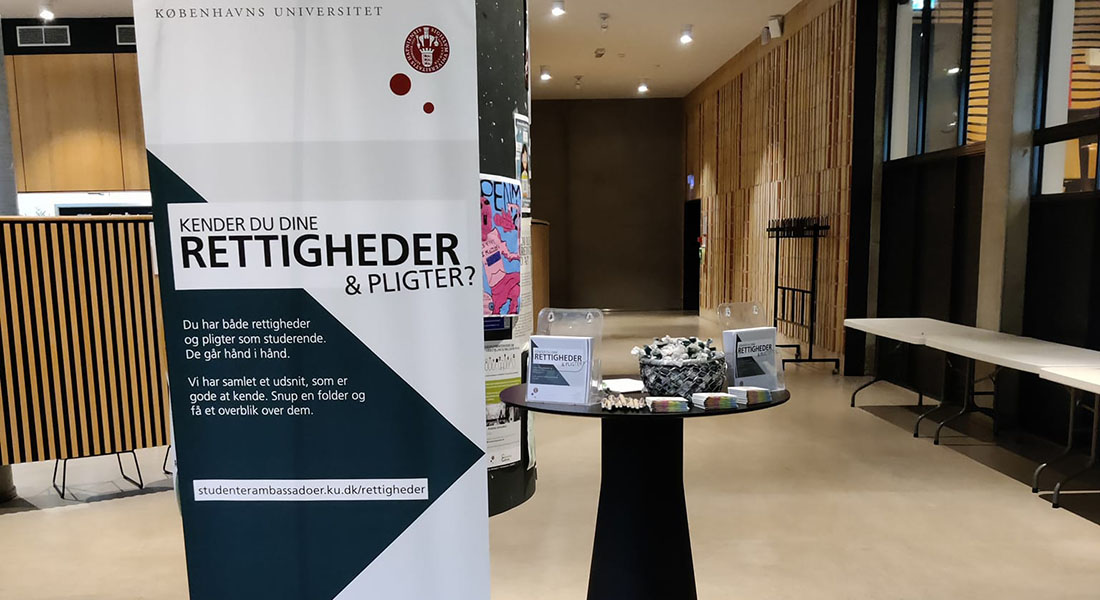The Student Ambassador’s newsletter Q3 2023
The Student Ambassador’s quarterly newsletter keeps you updated on how the Student Ambassador and many others are working to improve students’ legal rights and promote dialogue and understanding between students and the University.
Grey zones in academic practice: Do students know they cheat?
Via an article in the University Post in August titled 93 cases of exam cheating at the University of Copenhagen: It’s a trifling number, the Student Ambassador became aware of an academic article from March 2023: Grey zones and good practice: A European survey of academic integrity among undergraduate students. The article describes how European bachelor students often have difficulties identifying cheating, good academic practice and the in-between grey zones. We recognise this issue from many of the students suspected of plagiarism who contact us.
In general, students are responsible for knowing the rules on exam cheating. However, from many of the received enquiries, we can see that students would likely have benefitted from more information during their classes on how to avoid exam cheating.
In some situations, we see that heads of studies dismiss teaching staff’s reports on suspected exam cheating. In these cases, lectures could have talked more with their students about good academic practice in the academic field during classes.
Three of the four Danish contributors (from the University of Copenhagen) wrote an article about the study on Videnskab.dk in March: Bachelor students have difficulties finding the line between cheating and good academic practice (in Danish only).
They wrote:
"If students understand the rules and break them anyway, it may be relevant to look at how the rules are enforced.
However, sanctions alone would not be a particularly constructive approach to combating breaches made due to ignorance." (Goddiksen et.al., seen 5/10/2023)
Furthermore, the article describes that many of the participants in the survey could not identify neither examples of clear academic misconduct nor grey-zone cases that were not clearly described in the rules. The article’s authors do not suggest more lectures on academic integrity as the only solution. However, their discussion at the end of the article seems to call for teaching staff giving their students more information on the complex and context-dependent borderline cases. (Goddiksen et.al., 2023, pp. 16-17).
Since the establishment of the Student Ambassador in 2013, we have received 126 enquiries on suspected exam cheating.
Campus visits
At the end of Q3, we started a new round of campus visits. At these visits, we talk with students who drop by about rights and obligations at the University.
In September and early October, we visited North Campus (SUND/SCIENCE), South Campus (HUM), City Campus (SAMF) and Frederiksberg Campus (SCIENCE).
On 27 October, we visited South Campus (LAW/THEO).
On our website, you can see when and where we will be visiting campuses. Follow our Facebook page for location updates on the day.

Counselling needs
In Q3 2023, the Student Ambassador received 138 enquiries.
93 of the 138 enquiries were within the following three categories:
- Dispensation
- Exam appeals
- Legal complaint
The enquiries about dispensation were from students who wanted guidance on how to write a dispensation application. Three quarters of the enquiries were from students with functional impairments who wanted to apply for adjustments in relation to classes, exams or their syllabus, for example postponing the maximum completion time, in connection with study or semester start. During the exam period in August, we also received many enquiries about application for dispensation for additional exam attempts due to illness.
Enquiries about exam appeals were from students who wanted to submit an examination appeal. The majority of enquiries were from students who disagreed with the grading they received on a written examination.
The legal complaint enquiries came from students who wanted to know more about their complaint options and/or who needed guidance on what legal grounds that can be used for appealing a rejection (usually rejections of dispensation applications).
Dispensation: 37.7%
Exam appeals: 21.0%
Legal complaints 8.7%
Intake: 8.0%
Bullying: 6.5%
Suspected exam cheating: 5.1%
Credit transfer: 4.3%
Thesis delay: 3.6%
Other: 2.2%
Sick leave: 2.2%
SU: 0.7%
Deletion day
The Student Ambassador highly prioritises personal data protection, and we had our annual ‘deletion day’ in August. On the day, we reviewed our:
- personal and shared drives
- personal and joint email inboxes
- work mobile phones
- Facebook profile
We deleted all personal data which could no longer be stored in accordance with the student ambassador's data deletion policy.
As a reader of this newsletter, you probably also want to stay updated on anything new concerning GDPR, information security and data management at the University of Copenhagen. We recommend that you sign up for the newsletter from the UCPH data protection officer.
Subscribe to the newsletter from the UCPH data protection officer here (choose: ‘News about GDPR, data management and information security’. Find it under the category ‘Others’)
